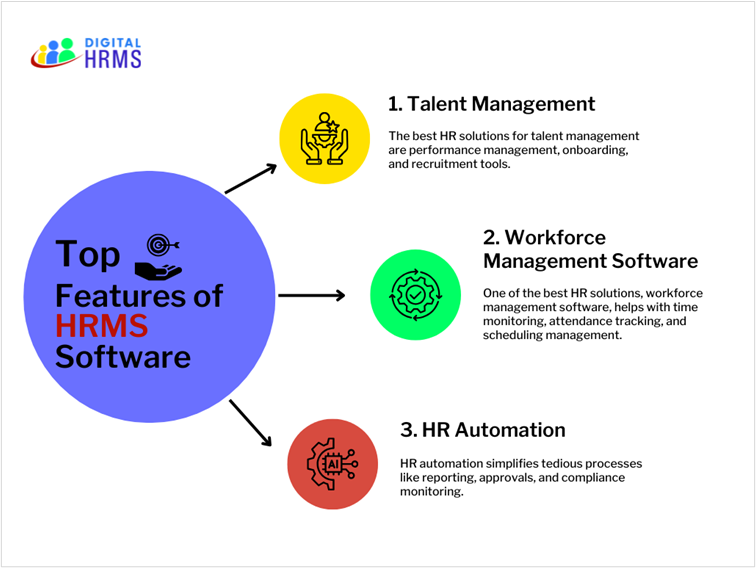HRIS Vs HRMS Comparing Tools for Streamlined HR Processes
.png)
In today’s fast-paced commercial environment, human resources are critical for driving organizational success. As the workforce varies, so does the technology that supports its management. From simple record-keeping systems to sophisticated, integrated solutions, HR technology has seen significant progression. Two of the most prominent tools in this discipline are the HRIS (Human Resource Information System) and HRMS (Human Resource Management System).
Although both are dynamic HR solutions, understanding their variances is essential for optimizing HR processes. Let us explore the distinctions between HRIS and HRMS software, comparing their features and benefits, and examining how modern businesses can successfully utilize them.
_and_HRMS_(Human_Resource_Management_System)..png)
What is HRIS?
HRIS is a software solution designed to skilfully manage core HR data and processes. This HR solution’s key focus is on handling employee-related data, payroll management, and ensuring compliance with law and standards.
Comprehensive Features of HRIS Software Include:
- Employee Data Management: Keeping accurate data records, such as personal details, job roles, and performance metrics.
- Payroll Software: Automating salary estimation and calculations, tax deductions, and benefits management are part of payroll software HR technology.
- Compliance Management: Ensuring adherence to international laws/policies and other regulatory requirements.
The benefits of implementing HRIS are several. This HR technology streamlines administrative tasks, reduces paperwork, and provides HR teams with a centralized system for storing and accessing data. While it is particularly suited for small to medium-sized businesses, its capabilities are somewhat limited compared to more all-inclusive HR solutions.
What is HRMS?
Through the integration of sophisticated capabilities that encompass the full employee lifecycle, HRMS software enhances HRIS functionalities. This all-inclusive HR management software combines contemporary HR technologies with conventional HR operations. You can unlock the potential of HRMS software and boost your efficiency.

Beyond merely storing data, HRMS software enables businesses to monitor productivity, improve employee engagement, and make data-driven choices. HRMS software is a popular option for both large enterprises and startups because to its flexibility.
HRIS software Vs HRMS software: Key Differences
To grasp the differences between HRIS and HRMS software, it's essential to look at their scope and functionality:
| Aspect | HRIS Software | HRMS Software |
| Core Focus | Data storage and compliance | End-to-end HR management |
| Key Features | Payroll, records, compliance | Talent management, automation |
| Scalability | Limited to core processes | Highly scalable and customizable |
| Ideal For | Small to medium-sized businesses | Medium to large enterprises |
While HRIS software is effective for basic HR functions, HRMS software provides a comprehensive solution that incorporates advanced features for thorough workforce management.
Why Modern Businesses Prefer HRMS Software Over HRIS Software
HRMS software presents significant advantages, making it the preferred option for today’s organizations:
Integration of Advanced HR Technology: HRMS software consolidates various HR processes, from hiring to retirement, into one platform.
Enhanced Employee Engagement: By offering tools for feedback, learning, and development, HR management software cultivates a motivated and efficient workforce.
Scalability and Customization: As companies expand, HRMS software evolves to meet changing requirements, ensuring ongoing effectiveness.
How Digital HRMS Stands Out as the Ideal HRMS Solution
Digital HRMS is a state-of-the-art HRMS software designed to confront the specific challenges of contemporary HR management. Its innovative features guarantee seamless integration and finest efficiency.
Key benefits of Digital HRMS include:
- Streamlining Employee Management System: Centralized data management for upfront access and updates are completed through the employee management system.
- Enhancing Payroll and Talent Management: Innovative tools for precise payroll processing and effective talent management.
- Automating HR Processes: Features such as automated workflows and real-time reporting help eliminate manual inadequacies.
Digital HRMS offers more than just basic functionalities; it provides a user-friendly interface, mobile app access, and robust data analytics for decision making. The capability of Digital HRMS to integrate with existing systems, like performance management tools, guarantees a consistent and effective HR ecosystem.
Organizations that implement Digital HRMS experience prominent enhancements in productivity, employee satisfaction, and decision-making, establishing it as the leading HRMS solution.
As companies aim to optimize their HR processes, the decision between HRIS and HRMS becomes crucial. While HRIS lays the groundwork for data management, HRMS stands out as the all-encompassing solution for contemporary HR challenges. Find more about the takeaway of HRMS vs HRIS.
By embracing an advanced HRMS software like Digital HRMS, organizations can achieve new heights of efficiency, engagement, and growth. Adopting this technology is not merely an upgrade—it represents a strategic step toward a smarter, more agile future in HR management. Please visit our website www.digitalhrms.com or email marketing@digitalhrms.com, someone from our team will get in touch with you.